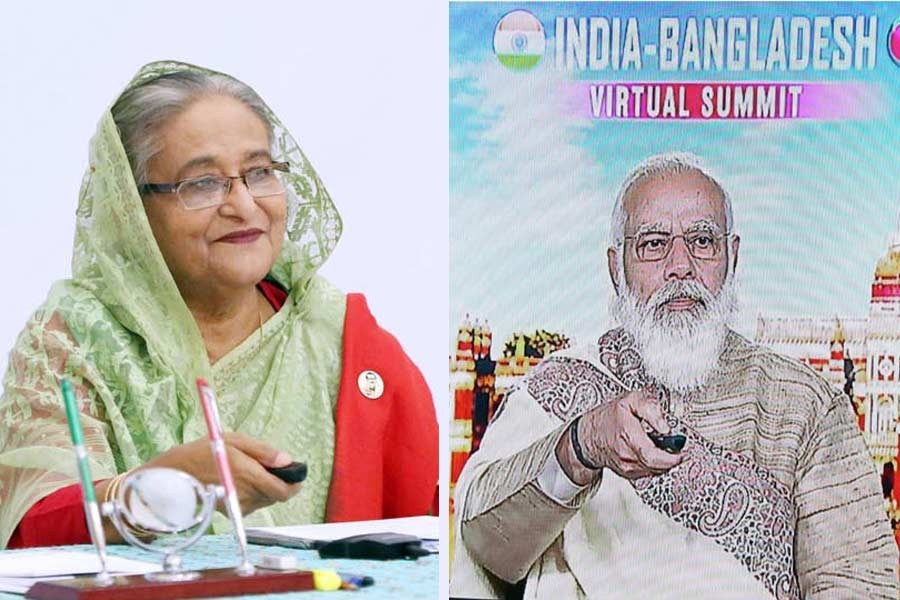Any high-level interaction between the two next-door neighbours---Bangladesh and India---does always generate expectations in both the countries. The latest virtual summit participated by Prime Minister Sheikh Hasina and her Indian counterpart Mr NarendraModi has not been an exception. Be the meetings held face to-to face or virtual, the top leaders do never fail to demonstrate the usual warmth and cordiality notwithstanding the fact that they, at times, have to deal with some contentious issues.
The relationship between the two countries that had gone through many odds in the past has reached a new height in recent years. As described by PM Sheikh Hasina during the last Thursday's virtual summit, India is Bangladesh's true friend. Reciprocating, Mr Modi termed Bangladesh as a 'key pillar' of his country's 'neighbourhood first policy'. Starting with Sheikh Hasina's visit to India in 2010, there have been several bilateral visits by the heads of governments, the latest being by Mr Modi in 2015. The Indian PM is also due to visit Dhaka in March next to attend the celebration of the country's golden jubilee of independence.
It is, thus, obvious that when two countries come closer, expectation about cooperation in all matters, including trade and economy, would go up. At the just-held summit, some old issues, including the contentious Teesta water-sharing, random killing of Bangladesh nationals by the Indian Border Security Force (BSF) and trade barriers did come up for discussion. As expected, not much happened except for the two leaders expressing their 'firm commitment' to resolve those in the future.
A few new issues, however, came up for discussion at the summit. The Indian PM invited Bangladesh to join the New Development Banks, an initiative of the five-nation BRICS platform. Sheikh Hasina reportedly sounded positive on that account. Though it is not clear until now the modus operandi of the proposed bank, Bangladesh might find a new source of international funding for its large infrastructure projects. As its economy has been expanding at an impressive rate, the country would need more external funds. However, it would prefer soft loans as provided by multilateral lenders like the World Bank, the Asian Development Bank (ADB) and the Asian Infrastructure Investment Bank (AIIB).
During the summit, Bangladesh expressed its interest in joining the road belt that would link India, Myanmar and Thailand. The Indian side, however, sought connectivity between its two states---West Bengal and Meghalaya---through Bangladesh. The regional connectivity has been one of the most-discussed issues in recent years. But not much progress could be made in this particular area because of the lack of reciprocity.
The repatriation of Rohingya is an issue of great import for Bangladesh. It is widely believed here that China and India being two powerful and influential neighbours of Myanmar could play a decisive role in the repatriation of the Rohingya refugees to their homeland. Bangladesh has been trying to get both the countries actively involved in the issue, but without any notable success. During the summit, India reiterated its pledge to support 'sustainable' repatriation of Rohingya. Hopefully, India, which has become a member of the UN Security Council recently, would sincerely pursue the repatriation issue with Myanmar.
The two prime ministers have set a unique example of friendliness by holding the virtual summit during one of the most difficult times the world has been facing. The hope is high here that India being the big neighbour would demonstrate a sense of accommodation in resolving all outstanding issues with Bangladesh.


